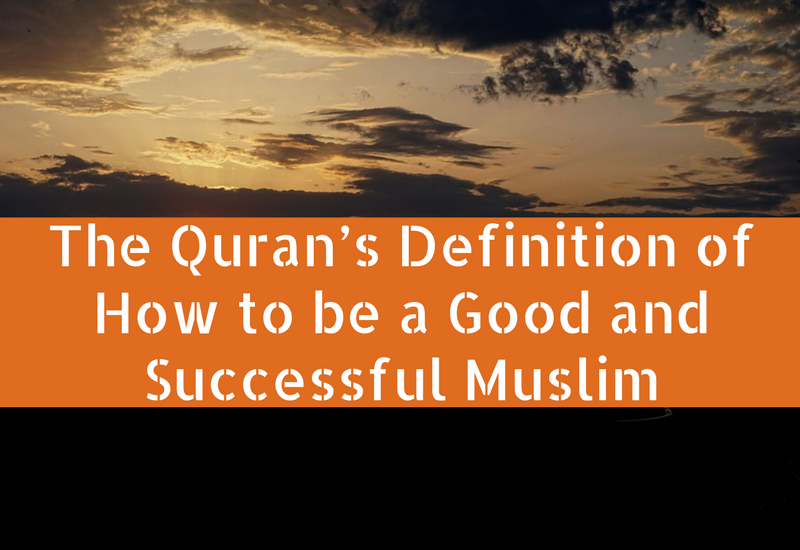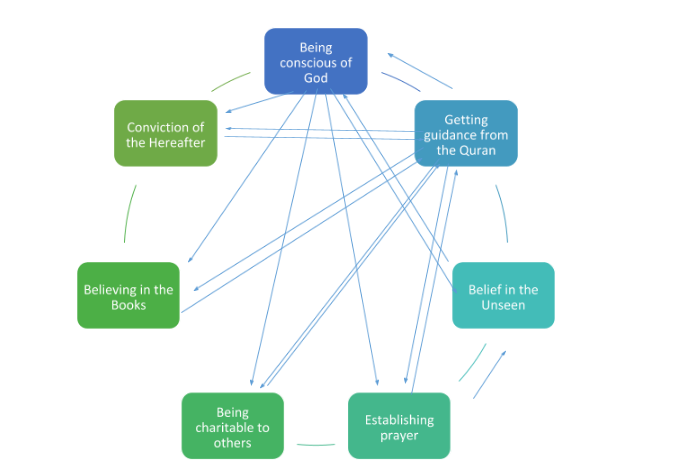In my last article, we looked at the qualities that branch out from a Muttaqi’s connection with the Quran. After Allah (swt) mentions these qualities, He wraps up the passage by saying with quite a bit of emphasis:
“Those are upon [right] guidance from their Lord, and it is those who are the successful.” (Quran, 2:5)
>>> Form a meaningful relationship with the Quran in as little as 10 min/day. Learn more.
Here we have a complete definition of success, the formula of what it takes to excel in life. The world today has its own definition of success – money, power, family honor etc. But, as we can see, Allah’s definition is completely different, and the most correct. When we pursue worldly goals, it gives us success in a limited sense. You can say that you are a successful businessman, but that doesn’t necessarily mean you’re successful in life. That’s why the world again and again proves that money doesn’t bring happiness, by the dissatisfaction experienced by the rich and powerful.
The true definition of a successful person is one who has the consciousness to protect his soul, who comes to the Quran for guidance and finds it, and who then progresses to adopt the fruits of that guidance. The most salient qualities of a successful person are:
“Who believe in the unseen, establishes prayer, and spends out of what We have provided for them, And who believes in what has been revealed to you, [O Muhammad], and what was revealed before you, and of the Hereafter they are certain [in faith].” (2:3-4)
You will find explanations of each of these qualities in the previous articles [taqwa part 1 and part 2]. Today, we’ll look at how all these qualities are interconnected, and how each strengthens and propels the other, thus lifting you in an upward cycle of success.
As Allah (swt) says in the second ayah of this Surah, only the Muttaqin, those conscious of God and have the sense of protecting their souls, benefit from guidance. In turn, guidance makes us have more Taqwa. Allah (swt) said to the Children of Israel:
“Take what We have given you with determination and remember what is in it that perhaps you may become righteous (tattaqun).” (2:63)
Getting this guidance from the Quran strengthens one’s belief in the Unseen world. Belief in the Unseen in turn strengthens one’s Taqwa and opens one’s heart wider to receive guidance.
“And for those who receive guidance, He increases (the light of) guidance.” (47:17)
Belief in the Unseen urges one to connect to Allah through daily prayers, and to be charitable to Allah’s creation. Because he knows Allah can see him, and the Angels are writing up his deeds, and so on. Establishing a regular connection with Allah in turn strengthens one’s belief in the Unseen as he feels linked to his Creator.
Guidance from the Quran obviates belief in it and the previous Revelations from Allah, as Allah (swt) mentions them repeatedly in it. Belief in the Quran’s authenticity in turn strengthens one’s ability to get guidance from it.
Belief in the Unseen world and establishing prayer makes firm one’s conviction in accountability after death, i.e. the Hereafter. When you believe in Allah and His attributes of goodness, mercy, perfection and justice, you can’t help being convinced that such a Creator and Master would not leave injustice unpunished or reward the good people.
Belief in the Hereafter in turn strengthens one’s sense of protecting his soul from evil, increasing one’s Taqwa. It also makes one vigilant in performing Salah and being good to Allah’s creation.
“You can only warn those who fear their Lord unseen and have established prayer. And whoever purifies himself only purifies himself for [the benefit of] his soul. And to Allah is the [final] destination.” (Quran, 35:18)
Dr. Islahi explains why conviction in the Hereafter was separately mentioned despite it being included in the category of belief in the Unseen: “It is specifically mentioned to show that though there are many who profess belief in the Hereafter, only those with these attributes – those who establish Prayer, who spend in the cause of Allah and who believe in all the revealed books of Allah – truly and really believe in the Hereafter and are certain of it.” (Islahi 117)
“The more a person’s commitment to good deeds and belief grows, the more will he gain in guidance.” (Islahi 114)
All this gives us a picture of how intricately connected these qualities of success are. It’s almost like a domino effect, and it all starts with:
“This is the Book about which there is no doubt, a guidance for those conscious of Allah.” (Quran, 2:2)
In the next article, we will in sha Allah look at those who don’t get guided from the Quran, whose hearts are sealed to it.
>> Understand the Quran in as little as 10 minutes/day. Click here to learn more
Related Video: 5 Habits of Highly Successful Muslims
Reference:
– Amin Ihsan Islahi, Pondering Over the Qur’an vol.1. Trans. Kayani. Kuala Lumpur: IBT, 2007.





Leave a Reply